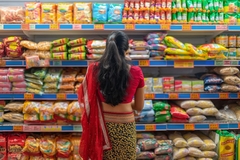
- Industry news
Industry news
- Category news
Category news
- Reports
- Key trends
- Multimedia
- Journal
- Events
- Suppliers
- Home
- Industry news
Industry news
- Category news
Category news
- Reports
- Key trends
- Multimedia
- Events
- Suppliers
UNEP and RSPO Sign New Agreement on Sustainable Palm Oil

14 Nov 2014 --- The United Nations Environment Programme (UNEP) and the Roundtable on Sustainable Palm Oil (RSPO) have signed a Memorandum of Understanding (MoU) that aims to raise the global awareness of sustainable palm oil and generate market demand for an important commodity that has the potential to play a key role in preserving the earth’s biodiversity.
Palm oil is the top-selling vegetable oil in the world and is found in 50 percent of all consumer goods. But conventional production methods – while offering huge economic and social opportunities for exporting nations -- are highly unsustainable and can cause serious damage to the environment.

Certified Sustainable palm oil, however, complies with globally agreed environmental standards that relate to social, environmental and economic best practices. Sustainable palm oil has the potential to make a significant contribution to the post-2015 Development Agenda, including UNEP’s efforts on Sustainable Consumption and Production (SCP) and Green Economy.
“Our hope is that by combining our political and institutional resources, we are able to add value to the efforts that are being undertaken by community groups, NGOs, national authorities and leaders in the business community,” said UN Under-Secretary General and UNEP Executive Director Achim Steiner. “The RSPO deserves our support in their commitment to produce palm oil sustainably.”
“Palm oil is a classic example of where win-win opportunities arise. The palm oil sector can provide leadership on how to use a global market place to improve production patterns and transition towards a greener, more inclusive economy,” Steiner added.
The RSPO, which was founded in 2004, counts over 1,800 members and is the world’s largest sustainable palm oil certification programme. The RSPO recently received a consultative status in the United Nations Economic and Social Council (ECOSOC).
“The signing of this MoU represents an opportunity to link sustainable palm oil to UNEP’s Sustainable Consumption and Production Programme,” said Darrel Webber, RSPO Secretary General “We are very confident that RSPO can assist UNEP in delivering the UN’s Sustainable Development Goals.”
The MoU commits both UNEP and RSPO to a framework of cooperation and understanding, and facilitates collaboration in regard to the transformation of markets to make sustainable palm oil the norm. At present, 18 percent of the global palm oil yield is certified by the RSPO, but market demand leaves half of that sustainably produced palm oil unsold.
Certification schemes for global commodities are key to adopting more sustainable production and consumption patterns and sustainable palm oil is a viable alternative to conventional production for producers and consumers. Nations that have committed to 100 percent RSPO-certified sustainable palm oil include the United Kingdom, France, Germany, Sweden, The Netherlands, Norway, Denmark and Belgium, and major corporations such as Nestle, Unilever, Carrefour and Johnson & Johnson and many others have followed suit.
In December, a new European Union law will require food labels to declare explicitly what types of vegetable oil – including palm oil – are listed among the ingredients.
Indonesia and Malaysia currently account for 87 percent of the palm oil exports, although production is rapidly expanding throughout Equatorial Africa.
With this MoU, UNEP’s initiatives, such as the UNEP-UNESCO Great Apes Survival Partnership (GRASP), will be able to engage more closely with the RSPO and its members to provide technical expertise in areas such as conservation of natural resources and biodiversity.
“The RSPO has been instrumental in establishing standards and principles that help reduce pressure on the natural habitats of many endangered species, including orangutans, whose population decline is mostly due to deforestation for conventional oil palm cultivation”, said GRASP programme coordinator Doug Cress.
“It is important that we do all we can to enforce these standards and principles, and ensure that the expansion of oil palm cultivation in Africa is done in a sustainable manner.”
The news came as IOI Loders Croklaan announced the introduction of a new and strengthened Sustainable Palm Oil Policy, which supersedes its existing policy and ensures:
1. No deforestation through the conservation of High Carbon Stock (HCS) forests and the protection of peat areas regardless of the depth;
2. Building a traceable and transparent supply chain;
3. Respecting the rights of employees, indigenous peoples and local communities;
4. Increased focus on driving beneficial economic change and ensuring a positive social impact on people and communities.
The new policy is effective immediately.
Ben Vreeburg, IOI Loders Croklaan’s Sustainability Director, says: “We felt it was necessary to work towards ensuring our Sustainable Palm Oil requirements were set out more clearly than in our existing Sustainable Palm Oil Sourcing Practices. Our new policy leaves no room for differences in interpretation and is better aligned with recent market- and stakeholders’ requirements.”
IOI Loders Croklaan’s commitment to sustainable practices affects the company’s entire supply chain, from the choice of its suppliers of palm (kernel) oil to how it operates its refineries. The policy also applies to all its suppliers of palm oil, palm oil fractions and palm kernel oil.
IOI Loders Croklaan has implemented a time-bound action plan to ensure that all palm oil products it sources are compliant with its own policy. “We strongly believe that a multi-stakeholder approach is the right way forward to transform the palm oil sector. We will continue to work with various stakeholders including our suppliers, customers, non-governmental organizations (NGOs), governments and independent verification bodies to implement our policy”, says Vreeburg.
The policy is an additional step in IOI Loders Croklaan’s commitment to support a sustainable and transparent supply chain. The company was:
1. The first to supply sustainable palm oil to continental Europe (2010);
2. The first to supply sustainable palm oil to the US (2011);
3. The first to supply its entire portfolio as RSPO mass balance (2012);
4. As of October 2014, 96% of the palm oil sourced worldwide is traceable (list of mills);
5. From June 2013 to September 2014, IOI Loders Croklaan has purchased 545.000 ton of RSPO certified palm oil.
IOI Loders Croklaan will continue to be an active supporter of the Roundtable on Sustainable Palm Oil (RSPO) and will work to strengthen the RSPO standard and its enforcement.









